We’ve all received scam phone calls before. Whether it’s someone trying to sell you an unwanted service, speaking in a language you can’t identify, or informing you that you’ve won some kind of crazy, excessive prize, there’s nothing quite like the let down of seeing your phone ring and picking up, only to immediately realise it’s a scam.
So what do you do then? Do you yell at the person on the other end? Do you immediately end the call and leave them hanging? Or, do you contemplate what it could be that might drive someone to make a phone call like that in the first place? For director Sam Rudykoff and Big Pig Production Co. executive producer Mark Delottinville, this latter point proved a source of inspiration. ‘What’s the story of the person trying to make the call?’.
In turn, this led to the creation of ‘Cruise’, a short (and dark) workplace satire about hapless telemarketers trying desperately to give away a free cruise. Winning many awards, including a Vimeo Staff Pick, the film is funny, brutal and absurd… and just might make you think twice the next time you hang up on a scam call.
LBB’s Josh Neufeldt sat down with Mark and Sam to explore how this creative endeavour came to life.
LBB> How did you come up with the idea for ‘Cruise’?
Sam> I’ve always liked stories that make you look at mundane things in a different light. Horror and comedy are both great for that. Scam calls are one of those things we all take for granted, even though they don’t make a lot of sense. It’s hard to imagine how it could be a good business model or who would want to make a living that way, yet they persist. So, I just started by asking myself what circumstances would lead a person to make scam calls in the first place, and it opened up into a fun little metaphor for horrible jobs in general.
LBB> Once you had an idea, how did you get started?
Mark> It all started over a plate of nachos; both myself and Sam at the time felt a bit tired from the work we had been doing at the time, and wanted something creative we could do on our own. It was something we were ready to do in 2020, but then the pandemic hit, and we had to put it off for another year… which was a blessing in disguise because I met our production designer during that time. The film had a different effect with her involvement.
Once we could actually film, it was a pretty standard affair for the two of us, as we have a lot of experience planning and executing productions. So, it was mainly getting there that took a long time.
LBB> What was the writing process like? Were there specific goals or touchpoints you knew the script had to follow?
Sam> It was more like writing a comedy sketch than a full-fledged film. Once I nailed down the concept, it was just about riffing on the various possibilities available in the room and figuring out a fun endpoint. From a practical standpoint, I also wanted to make sure the scope was small enough that we weren’t stretching our budget too thin. Mark and I have backgrounds in production, so we didn’t want to leave too much to chance.
LBB> Building on this, what did it take to bring the characters to life? Are the salespeople based on anyone in particular? And how did you flesh out the phone respondents and the executioner?
Sam> Our cast deserves all the credit here. Keeping the film as short as I wanted meant the script didn’t have much room for character development, but still needed to get blood from a stone, so to speak. I wanted to make sure the phone calls all felt different for the sake of variety, and to give Simon Pond and Chad Andrews (our two callers) different scenarios to play against. Simon, who played Mark, had just the right amount of deadpan awareness to bring out the comedic elements in the script. And Ray James, our executioner, did almost all his acting with his face and knocked it out of the park!
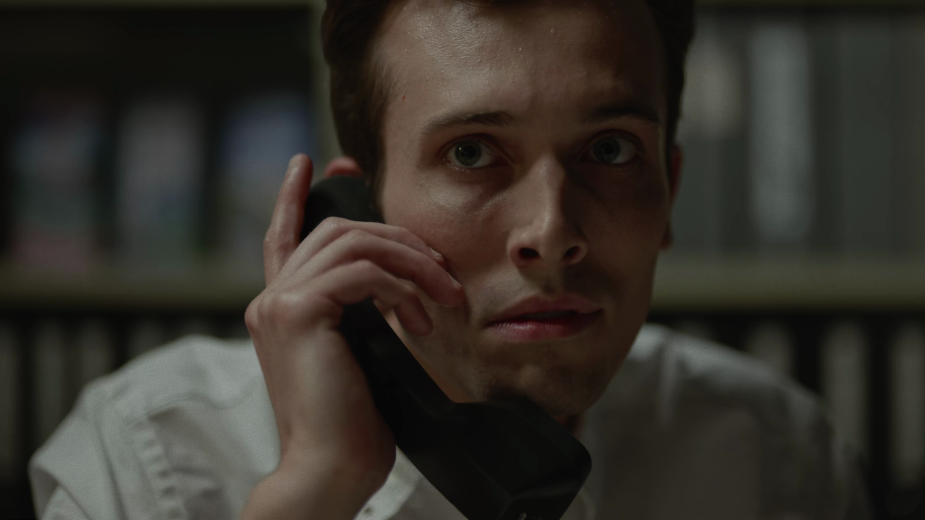
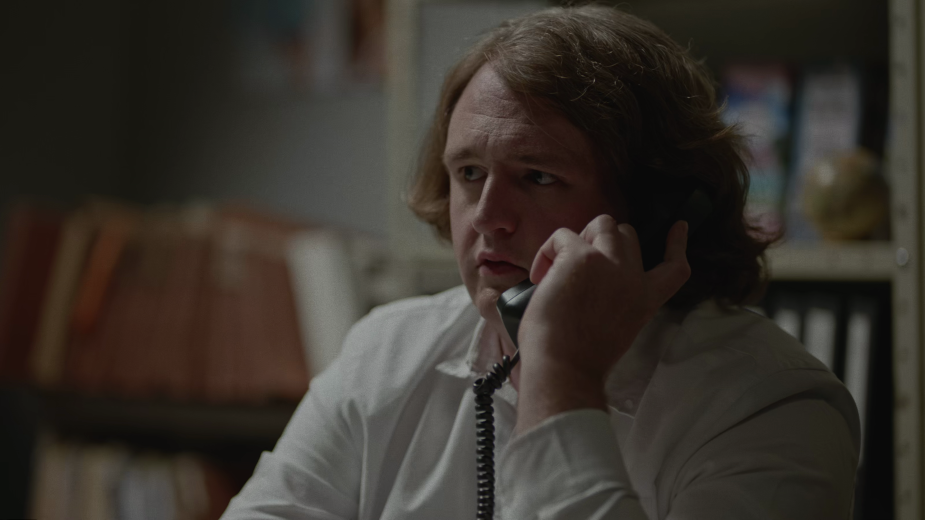
LBB> Where did you shoot? How did you find the right location, and how did you turn it into an eerie office?
Mark> We filmed downtown Toronto at the Gladstone location of a work-share office – similar to WeWork, called Spaces – and it was a completely blank room. Spaces were great to work with. Because no one was coming into the office due to the pandemic, we had free reign to do what we wanted. We painted the walls, brought in our props, and made the room our own.
The real MVP, however, was our production designer, Rebecca Petro. She took the room from being blank and boring and made it a central character in the film. Rebecca brought so much to the table that influenced the film’s success. Ultimately, it was just a blank room, and would have been visually dull without her.
Sam> I told Rebecca I wanted the set to look a little bit like ‘Dilbert’ and a little bit like a prison, and she created something far beyond my wildest hopes.
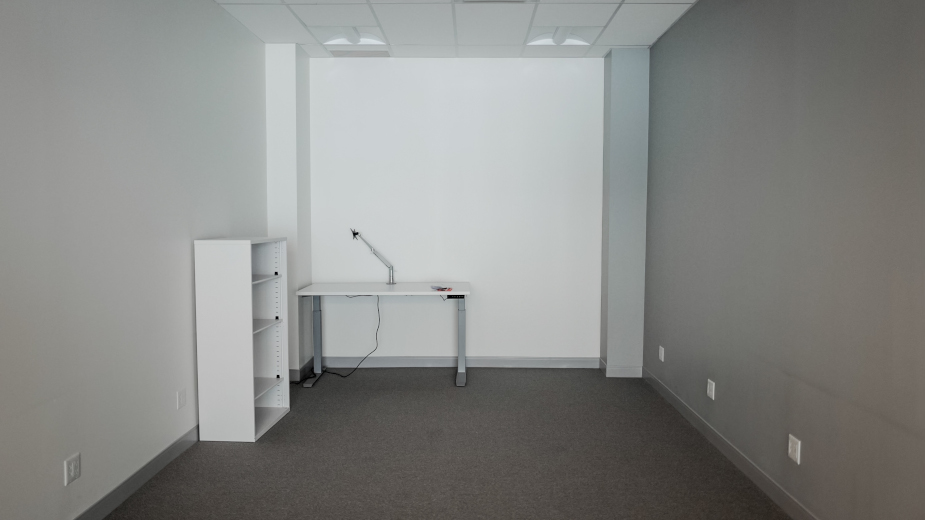
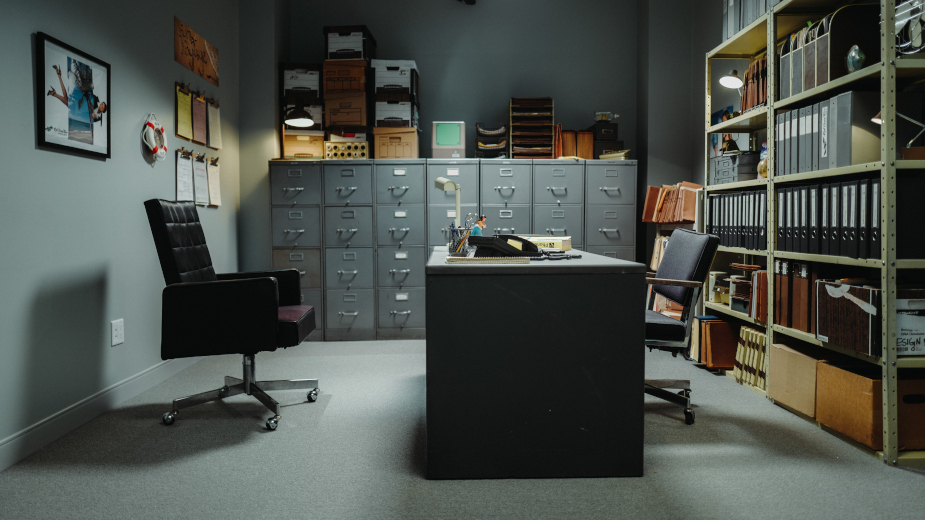
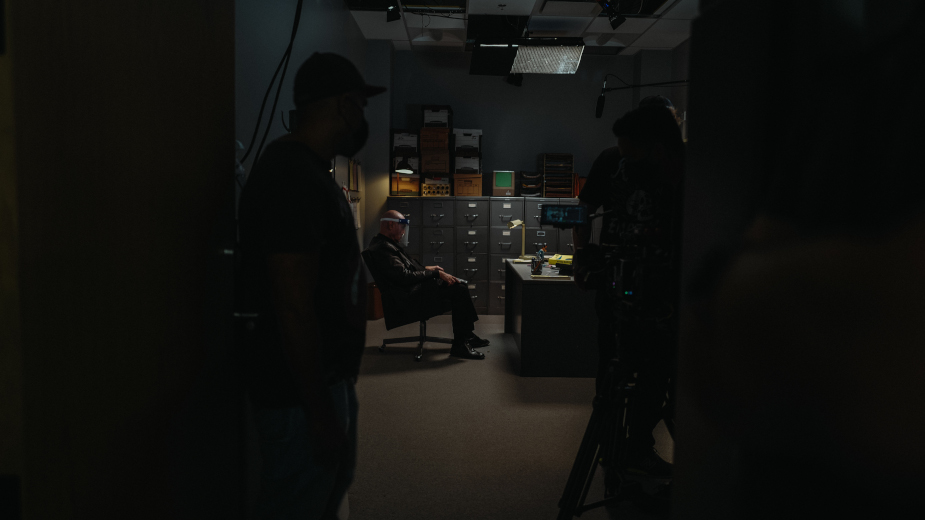
LBB> For the shoot, what type of equipment did you use, and what inspired your choices?
Mark> We were clever in situating all the action in one room and having that room be unaffected by light from windows. It allowed us to light and shape the look we wanted, and this also allowed us to keep our lighting and camera setups small. Because of this, we rented an all-in-one sprinter package for our grip and lighting, which was more than enough for our film and was affordable.
For the camera and lenses, I remember saying to Sam, ‘If we are only going to do this once, not knowing if people will even like our work, let’s make it look the best we can’. So, we went all out for our camera and lens package. We ended up using the ARRI primes and the ALEXA Mini LF for the shoot, and I am so glad we did, as the shots look great. The other aspect of using such a fantastic camera and lens pairing is that when watching the film on a big screen, it looks terrific.
In short, the driving choices were that we wanted it to look as good as it possibly could, and have a high production value – similar to the movies we love.
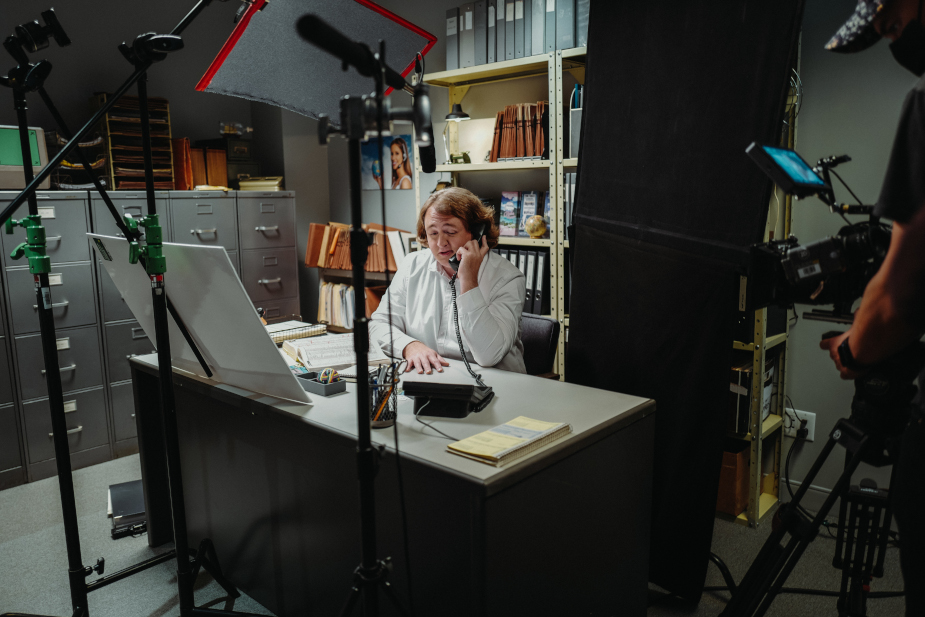
LBB> What were your goals for the aesthetic and colour of the film?
Mark> Peter Schobb, our cinematographer, was the driving force (along with Sam) to shape this look. We had used this service called Shot Deck which was incredibly helpful in getting inspiration, and it allowed us to not only shape the face of the film, but also the types of angles we felt would be great.
Sam> Since the concept requires a fair amount of suspension of disbelief, we wanted it to feel like an alternate universe without being totally sci-fi. The idea was to create an anachronistic vibe where viewers could accept things like phonebooks without asking too many questions. It’s a dark story in terms of tone, so we wound up with a pretty dark palette. We were all big fans of intense, noirish visuals, which is pretty obvious watching the film.
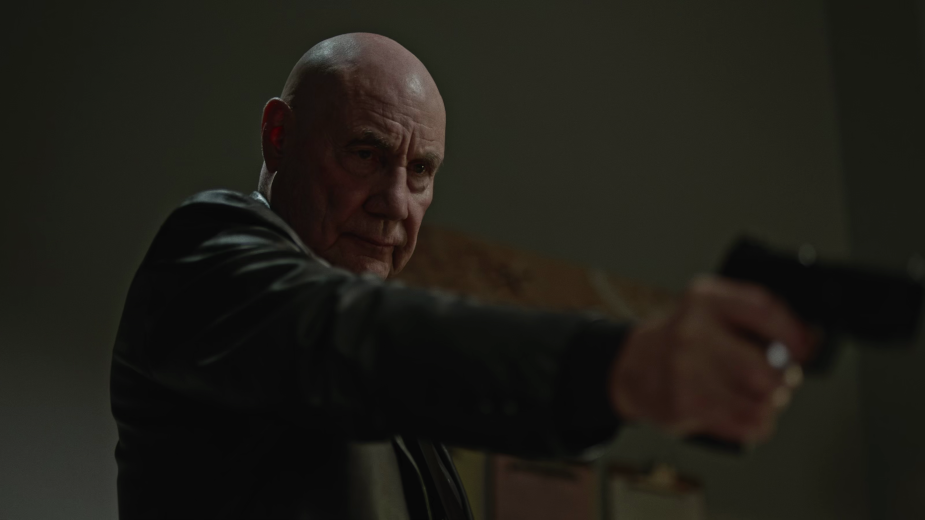
LBB> Both of you shared producer responsibilities. What was this process like? And practically speaking, how did you collaborate to create the best possible end product?
Mark> It helps a lot that both Sam and I have very similar tastes in film, and we generally agree on what looks good and what doesn’t. Another thing that helped was that the script was great, and we took the time to get it right (or Sam did). I was the Ben Affleck to his Matt Damon in this equation – to dial it into a point we were pleased with.
Having a great script is half the battle because you have such a solid foundation to work with. We also had the time, with the pandemic, to develop the writing and story and also with the post-production to feel more relaxed with our edits. If we didn’t like something, we had the time to try different versions.
Sam> Our skill sets are very complementary, and we trust each other’s judgement. Those things are all you can ask for when collaborating on a project!
LBB> Tell us about casting! How did you come across the perfect set of characters?
Mark> We had a lot of help from Ashley Hallihan and Ian Bender from Hallihan Casting. I have worked with Ashley and Ian for years, and they know what they are doing when it comes to getting the right people for the story.
Beyond that, Sam was responsible for dialling in the characters of Jake and Mark, and he spearheaded that process – knowing exactly what he wanted. Regarding Ray James, who played our executioner, I felt he was the only person for the job when I saw his headshot.
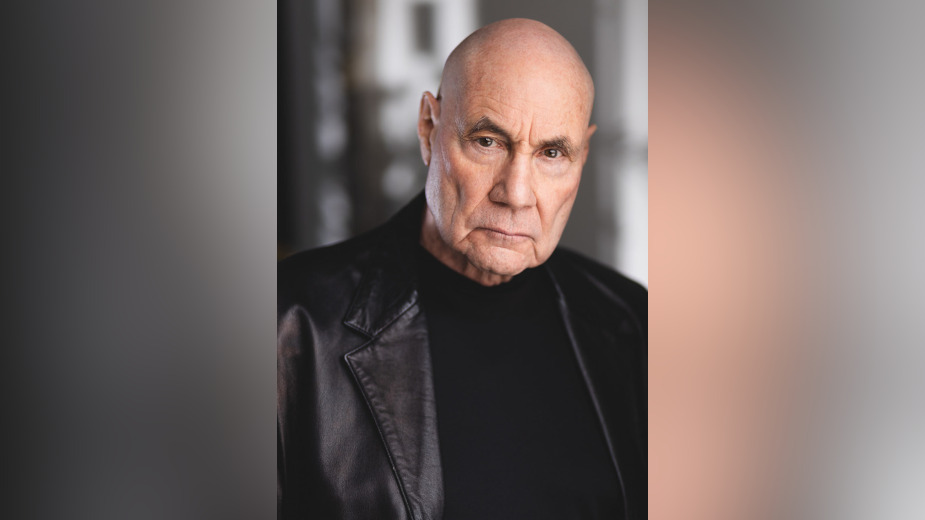
LBB> Do you have any anecdotes to share from on-set?
Mark> Our shoot went smoothly which was a huge relief, as we were worried that we wouldn’t be able to get all of our pages in a single day, especially since we had SPFX shots to get as well. Those were a big unknown, but ironically we pushed through those quickly.
The one very annoying thing was at the start of the day, we had to test our actors for covid-19 rapidly, but unfortunately, the medical team we were using completely forgot about our booking. I had to have our actors sit outside our set until they rushed there. And, if you have been to Canada at the end of September, it is not exactly the warmest of months… especially at 7 AM. I felt terrible, but there was nothing I could do. Luckily they finally showed up and no one had covid-19, so it all worked out. But, it was a bit of a hairy way to start the day!
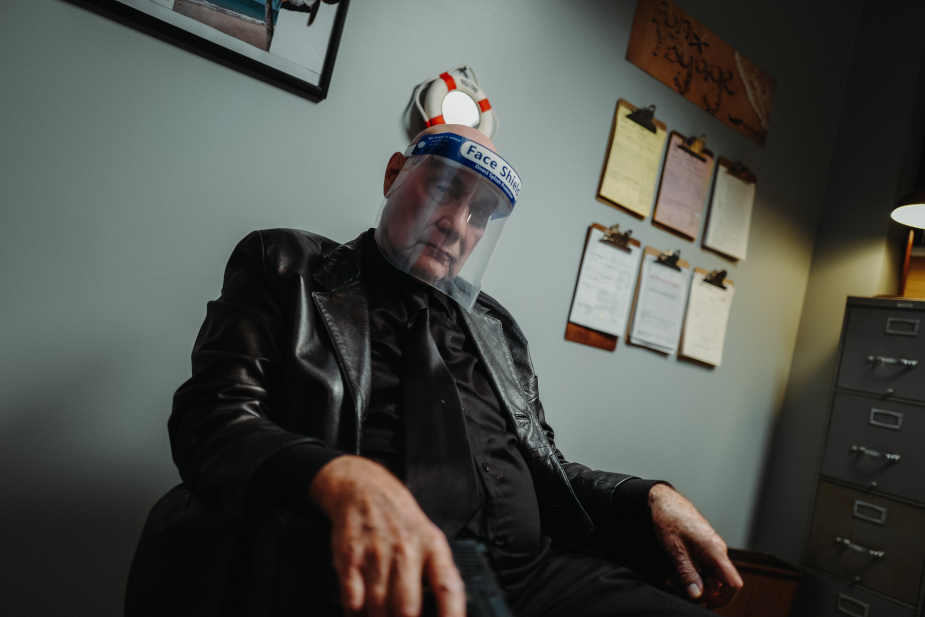
LBB> The sound design is brilliant, from the guy’s knee bumping into the desk to the eerie motifs every time a call fails. How did you bring these aspects to life and use music to enhance these qualities?
Mark> Marcel Ramagnano, our composer, and Mark Rozeluk, our sound designer, made the film come to life in post-production. It is incredible how dark and ominous tones can set a mood, whether comedic or dreadful. We knew these things would add to the film, but we wanted them in more of a supporting role – knowing exactly their intention without being over the top. Ultimately, we had an excellent balance of adding to the tone while also not being too obvious.
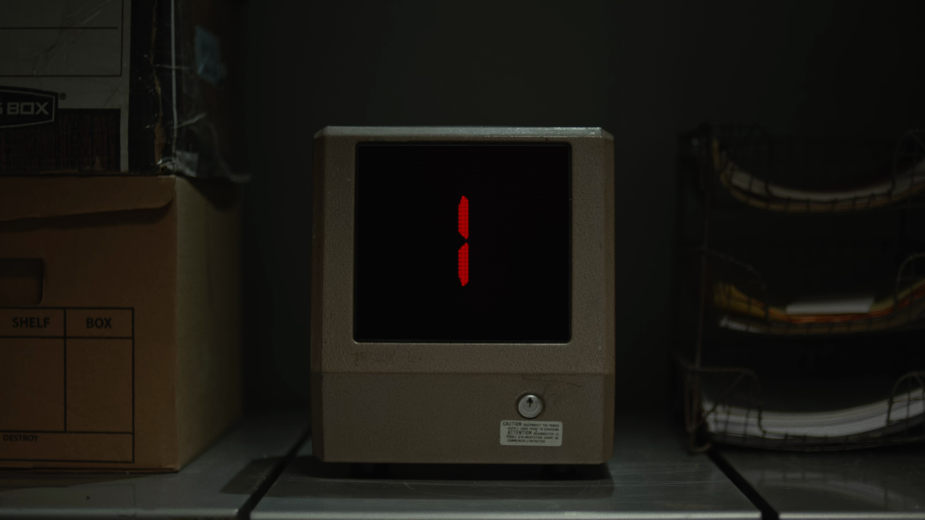
LBB> Building on this, what was the editing process like?
Mark> I have seen this film more than a hundred times after the number of rounds we did on it. One thing evident from the start was that we wanted to make the edit as tight and short as possible. When I initially began working in the film/television/commercial industry, my first job was in short film distribution, and from that, I knew that shorter was always better. Especially when it comes to programming films at festivals: the quicker the film, the better chance you have at it being programmed in the festival. It ensured we could include the humour we wanted, without letting it linger.
Comedy is as challenging as it is a delicate balancing act between landing a joke and keeping the pace consistent. Once I had done around four or five rounds and there was a coherent story, I remember playing it on my living room TV and thinking, ‘This could work!’ – something I had never felt about another narrative project I had created.
The funny thing is that in the end, after finishing the film – after all the hours, late nights, and creative changes – it’s actually very anticlimactic because there is not much you can do at that point. For me, I exited my home office and said to my wife, ‘It’s done’. She responded with “Yay! What now?’ and I said, ‘I don’t know’. I didn’t know how to reach the next step. It was all so unknown.
Sam> I work in advertising and do stand-up as a hobby, and both teach you the value of brevity. That was the guiding light through our edit. My inclination is to hack away anything I don’t love and then begrudgingly settle for whatever else is needed to stitch that stuff together. I am not saying this is the right approach! But it’s mine.
LBB> What is your favourite shot from the film, and why?
Mark> I have two favourite shots. The first is when Jake (Chad’s character) is looking at the camera once his final phone call hangs up on him. It’s excellent. It’s one of the shots we used for one of our stills, and it instantly gets across that something horrible is about to happen – setting the tone for the rest of the film.
My second favourite shot is the very last shot of the film. We got it on the first take, and it was perfect. I don’t want to spoil it, but it was the one shot everyone on set wanted to watch to see how it turned out. Luckily, we nailed it right away.
Sam> All the shots are my favourite!

LBB> Since release, ‘Cruise’ has managed to win a whole bunch of awards! What does this success mean to you?
Mark> It provides validation in terms of how people like our work. With any new venture – undoubtedly public-facing – I am worried about how somebody will receive something. Showing your work to friends and family will always get a more supportive and positive reaction than a room full of strangers. So, when you show a piece of work and the response is positive, and even more than that, considered the best at a particular festival, it helps validate that we know what we are doing. And beyond that, it makes us want to start the next project!
Sam> I’m a total sucker for a bit of validation, so winning is always nice, and I’m thrilled that so many people seem to have enjoyed it! You have to take it with a grain of salt though; we’ve all seen heavily awarded works of art that we thought were overrated. So, I don’t want to rest on our (festival) laurels.
LBB> Is there anything you’d like to add?
Mark> I wanted to give a genuine big thank you to all the crew once again; they all know how appreciative we are of them, but it changed my career, and without them, I wouldn’t have been able to do that. Also, a big thank you to my mother-in-law – one of the phone call voice actors. She nailed it.
Sam> Yes! Thanks to everybody who worked on the film and trusted us with their talents, and also to everybody who took the time to watch it.
